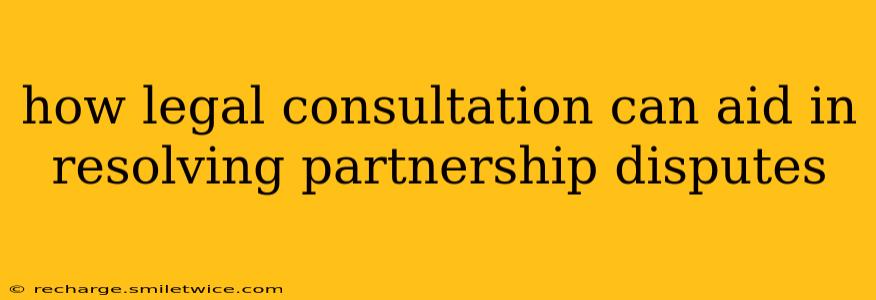Partnership disputes are unfortunately common, arising from disagreements over finances, management, or the future direction of the business. Navigating these conflicts can be incredibly complex and emotionally draining, often leading to costly legal battles if not handled carefully. This is where seeking legal consultation proves invaluable. A skilled attorney can provide crucial guidance and support throughout the entire process, significantly increasing the chances of a successful and amicable resolution.
What are Common Partnership Disputes?
Before delving into the benefits of legal consultation, let's understand the typical issues that trigger disputes among partners. These often include:
- Financial disagreements: Disputes over profit sharing, capital contributions, withdrawals, and expenses are extremely common. One partner may feel they're contributing more than they're receiving in return.
- Management conflicts: Differences in opinions on business strategies, operational procedures, and decision-making processes can lead to significant friction.
- Dissolution of the partnership: When partners decide to end their relationship, disagreements often arise over asset division, valuation, and outstanding liabilities.
- Breach of contract: One partner may allege the other violated the terms of the partnership agreement, leading to legal action.
- Intellectual property disputes: If the partnership involves intellectual property, ownership and usage rights can become major points of contention.
How Can a Lawyer Help Resolve Partnership Disputes?
A legal consultation at the outset of a dispute, or even proactively before issues arise, is crucial for several reasons:
1. Understanding Your Legal Rights and Obligations
A lawyer will thoroughly review your partnership agreement (if one exists) and relevant legislation to clarify your rights and responsibilities. They can identify potential legal loopholes and highlight areas where your interests might be vulnerable. This understanding forms the bedrock of any effective negotiation or legal strategy.
2. Negotiating a Settlement
Many partnership disputes can be resolved through negotiation and mediation. A lawyer can act as your advocate, skillfully negotiating with the other partners or their representatives to reach a mutually acceptable agreement. Their experience in handling similar cases allows them to anticipate potential challenges and develop strategies to overcome them.
3. Mediation and Arbitration
If direct negotiation fails, your lawyer can guide you through alternative dispute resolution (ADR) methods like mediation and arbitration. These processes offer a less formal and often more cost-effective way to resolve the dispute than litigation. A lawyer's expertise ensures your interests are represented effectively during these proceedings.
4. Litigation as a Last Resort
In cases where negotiation and ADR fail, litigation may become necessary. A lawyer will represent you in court, presenting your case effectively and protecting your legal rights. They will navigate the complexities of court procedures, ensuring you're prepared for all eventualities.
5. Drafting and Reviewing Partnership Agreements
Proactive legal consultation is key to preventing future disputes. A lawyer can assist in drafting a comprehensive partnership agreement that addresses potential conflict areas, clearly defining the roles, responsibilities, and financial arrangements of each partner. They can also review existing agreements to identify potential weaknesses and suggest amendments.
What are the Benefits of Early Legal Consultation?
Addressing partnership disputes early on significantly minimizes potential costs and emotional distress. Early legal consultation helps prevent:
- Escalation of conflict: Prompt intervention can prevent minor disagreements from escalating into major legal battles.
- Loss of valuable time and resources: Early resolution saves time and resources that would otherwise be spent on protracted litigation.
- Damage to business reputation: Public disputes can severely harm a business's reputation and client relationships.
- Financial losses: Early resolution can prevent significant financial losses associated with extended legal battles.
What Questions Should I Ask a Lawyer During a Consultation?
During your initial consultation, ask your potential lawyer:
- What is your experience handling partnership disputes?
- What is your fee structure?
- What is your recommended approach to resolving my specific dispute?
- What is the likely timeline for resolution?
- What are the potential outcomes of my case?
Seeking legal consultation when facing a partnership dispute is not merely advisable—it's essential. An experienced attorney provides the expertise, guidance, and advocacy needed to navigate this complex area effectively, maximizing your chances of a favorable outcome. Remember, proactive legal planning can often prevent disputes altogether, making it a worthwhile investment for any partnership.
